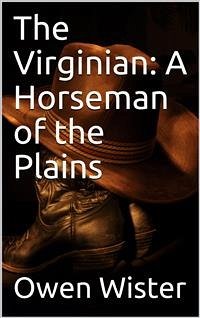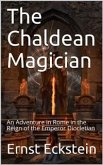The Virginian (otherwise titled The Virginian: A Horseman of the Plains) is a 1902 novel set in the Wild West by the American author Owen Wister, (1860-1938). It describes the life of a cowboy on a cattle ranch in Wyoming and was the first true fictional western ever written, aside from short stories and pulp dime novels. The Virginian paved the way for many more westerns by such authors as Zane Grey, Louis L'Amour, and several others. The novel was adapted from several short stories published in Harper's Magazine and the Saturday Evening Post between Nov 1893 and May 1902. The novel begins with an unnamed narrator's arrival in Medicine Bow, Wyoming from back East and his encounter with an impressively tall and handsome stranger. The stranger proves adept at roping horses, as well as facing down a gambler, Trampas, who calls him a son of a bitch. (At the time, the word was an unacceptable insult in any society, except between joking friends.) The stranger lays a pistol on the table and gently threatens, “When you call me that, smile!" Known only as the Virginian, the stranger turns out to be the narrator's escort to Judge Henry's ranch in Sunk Creek, Wyoming. As the two travel the 263 miles to the ranch, the narrator, who is nicknamed the Tenderfoot, and the Virginian come to know one another as the Tenderfoot slowly begins to understand the nature of life in the West, which is very different from what he expected. This meeting is the beginning of a lifelong friendship and the starting point of the narrator's recounting of key episodes in the life of the Virginian. The novel revolves around the Virginian and the life he lives. As well as describing the Virginian's conflict with his enemy, Trampas, and his romance with the pretty schoolteacher, Molly Stark Wood, Wister weaves a tale of action, violence, hate, revenge, love, and friendship. In one scene, the Virginian is forced to participate in the hanging of an admitted cattle thief, who had been his close friend. The hanging is represented as a necessary response to the government's corruption and lack of action, but the Virginian feels it to be a horrible duty. He is especially stricken by the bravery with which the thief faces his fate, and the heavy burden that the act places on his heart forms the emotional core of the story. A fatal shootout resolves the ongoing conflict with Trampas after five years of hate. After Trampas shoots first in a duel, the Virginian shoots Trampas in self defense and leaves to marry his young bride. The Virginian and Molly ride off together to spend a month in the mountains and then journey back East to Vermont to meet her family. They are received a bit stiffly by the immediate Wood family, but warmly by Molly's great-aunt. The new couple returns to Wyoming, and the Virginian is made a partner of Judge Henry's ranch. The book ends noting that the Virginian became an important man in the territory with a happy family.
Bitte wählen Sie Ihr Anliegen aus.
Rechnungen
Retourenschein anfordern
Bestellstatus
Storno









